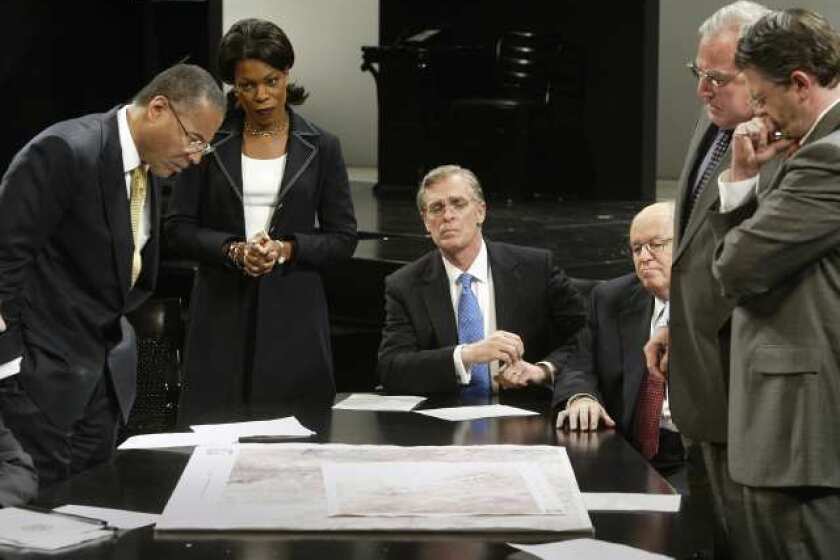Playwrights on Writing
An occasional series appearing in Sunday Arts & Music.
- 1
His own failure to understand a situation leaves the ‘Bengal Tiger’ creator mulling some of the subtlest aspects of communication.
- 2
The playwright ponders the relative ease and financial advantages of turning out movie scripts rather than toiling over theater projects, which have their own rewards.
- 3
And that’s precisely what bothers some people. All that structure and all that plot may keep the audience interested, but some say they confine creativity.
- 4
Write, test, listen, cut, rewrite. Five playwrights on the drama of development at South Coast Rep
- 5
The phrase ‘sad little play’ hung in his mind -- no way did he want them applied to his new script. Perhaps it was time to rearrange his thinking.
- 6
Adapting Betty Comden and Adolph Green’s ‘The Bandwagon’ was a labor of love for Douglas Carter Beane.
- 7
Yes, the director should be in charge now, only the author is the director. Fortunately, she’s learned humility.
- 8
To lure a new generation, shelve the tried and true. Let the audience learn to imagine again.
- 9
In a world where fact and fiction blur, sometimes invention is the shortest route to truth.
- 10
When great actors are denied great roles because of their skin color, there’s a problem. Even if they are white.
- 11
Dead? Just the opposite. Theater is very much alive, because it’s live. And best of all: You get to share it.
- 12
What would boost the odds of our Round Table romp becoming a Vegas success -- a nude King Arthur on ice?
- 13
Whenever I try to write a worthwhile play, I find it helps to see just how awful I can be.
- 14
My wildly careening career ride may have seemed like a string of detours, but as it turned out, it didn’t take me a single mile out of my way.
- 15
There’s no mapping it out. Stories can come from the dramas that just happen to unfold, often things you can’t foresee.
- 16
Responsibility is a burden, and we in Culture Clash often feel its weight. But would we be true to ourselves if we settled for a song and dance?
- 17
Billy Crystal started writing “700 Sundays” as a meditation on his father’s premature death. Reliving the anguish, healing and humor, he’s learned to trust his instincts — and his audience.
- 18
Lying. Some people might call it pathological. Rick Cleveland calls it “The Beginning of How I Became a Writer.”
- 19
That movie, that play, that war — its title may not be logical, or barely true. One can rail against it or, quite simply, join in.
- 20
The road to “Avenue Q” has had more than a few bumps and turns. But the audience is always there giving clear directions about which way we need to go.
- 21
One wouldn’t expect an elderly gay transvestite to be so beloved, but rooting for the underdog is a reminder that through insecurity comes strength.
- 22
Art takes us to a place that journalism can’t: the psychological heart of the characters in an epic story like the buildup to war against Iraq. Hence my play “Stuff Happens.”
- 23
Nothing’s better than a coffee shop — or a deli or barbecue joint or taco stand — for overhearing honest conversation and witnessing L.A. life uncensored.
- 24
In studying the folk tales that were handed down by my people in bondage to teach and comfort, I learned vital lessons about the people themselves. And that led me to create “Flight,” set on a plantation in 1858.
- 25
I had a happyish childhood.
- 26
If we’re formed by our experiences, shouldn’t our work be as well? Even Shakespeare cribbed from Cervantes and other earlier work.
- 27
Writing books is scant preparation for the collaborative land mine of writing for stage or screen.
- 28
Playwright Donald Margulies finds in his home borough not only a tug to the traditional but the allure of the unknown.
- 29
The West Coast’s brand of democracy beckoned, and I had to heed the call. Somewhere between the paid petitioners and tree-sitters, I found a spirit to admire.
- 30
How the relationship between Sabina Spielrein and Carl Jung -- and Freud -- inspired me to dramatize Jung’s tormented life.
- 31
Part of writing a play is letting it go.
- 32
The effort to really hear the dialogue, as well as the pauses in between, is the theatergoer’s greater reward.








